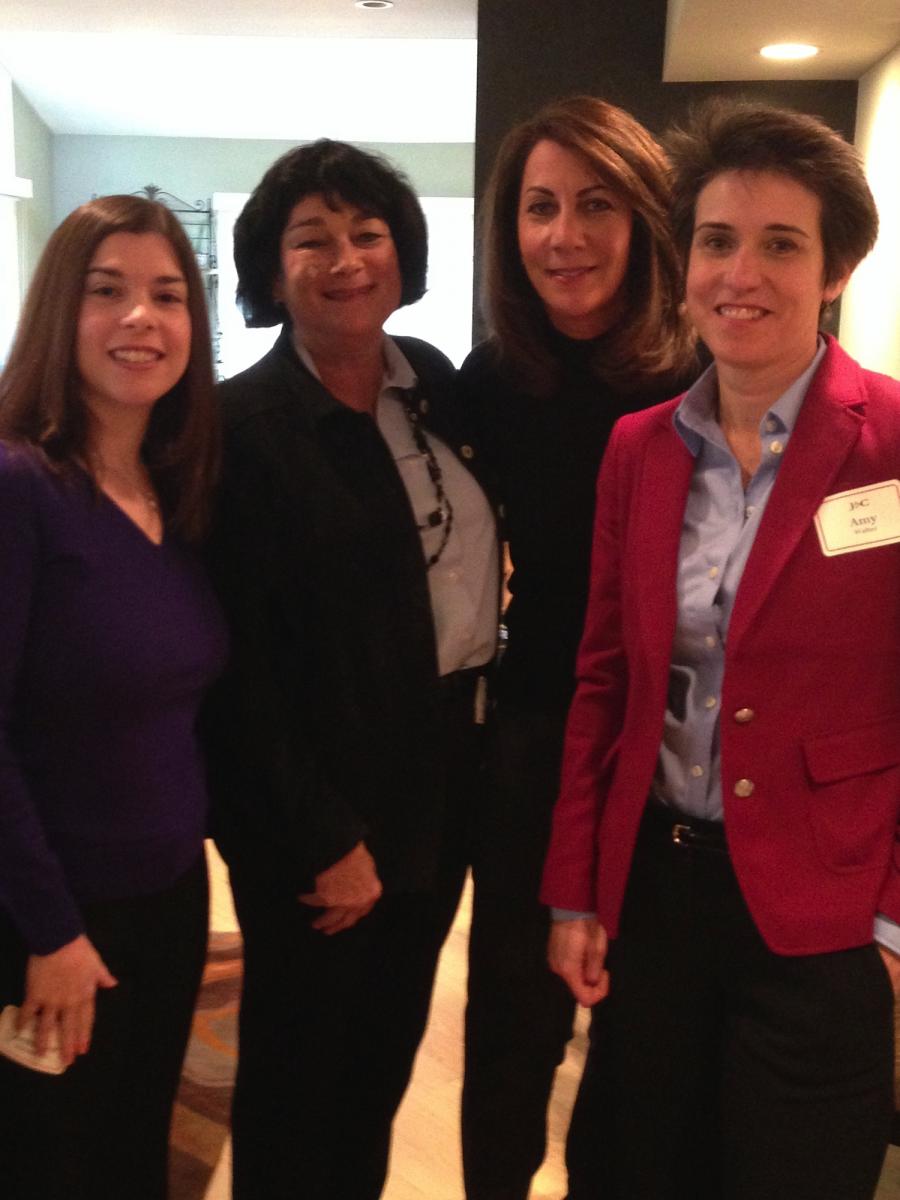Newsbreak Year-End Update 2013


As we collectively reflect upon the 2013 "year in review," it seems to me there is cause for plenty of heartfelt ambivalence. We recognize the one year anniversary of the tragic Newtown, Connecticut, school shooting with no major gun violence prevention legislation passed at the national level. JAC continues in its efforts to advocate for common sense gun laws through our participation on the Gun Violence Prevention Table as well as our ongoing dialogue and visits with elected members of Congress. But we can appreciate and find hope in the initiatives and changes being made in individual states including Colorado, Connecticut, California, and others. Change happens when people stay engaged.
The efforts of the State Department in the Middle East have drawn criticism and accolades alike. The Jewish community in this country has weighed in on the peace process and recent developments regarding Iran with a variety of different opinions. The next six months will be very telling in regard to the effect of diplomatic efforts and their outcome.
The attack on women's reproductive rights in the past year has been unprecedented. State legislatures across the country have enacted laws eroding a woman's fundamental freedom to make decisions about her own body. Forty-one states have passed restrictions on abortion in one form or another, including measures designed to harass and shut down reproductive health care providers. Inaction is not an option. Remaining hopeful means remaining engaged.
JAC will always be an important resource in helping to keep its members informed. Sorting fact from fiction is critically important, and JAC members must be able to stand up for the truth. Knowledge is power, and change is possible when informed people stay engaged. Help us spread the word about JAC, and may our collective hopes and actions create a new year of possibilities and peace.

Benjamin Netanyahu was elected for a third term as Prime Minister of Israel in January of 2013. Voter turnout was high at 66 percent as Netanyahu ran on a plank of security – stopping Iran from obtaining a nuclear weapon – fiscal responsibility, and political responsibility, including the Peace Process.
President Obama went to Israel in March, on the first foreign trip of his second term. The trip was highly successful, as he met numerous times with PM Netanyahu and discussed areas of mutual importance. Israeli President Peres presented Obama with the Presidential Medal of Distinction, thanking him for being a true friend to Israel and for providing technology and weaponry to prevent rocket attacks and terrorism. Obama spoke to university students and was very well received. (Jerusalem Post, 3/21/13) Military and intelligence cooperation between the U.S. and Israel has risen to unprecedented levels during the Obama administration. (Arutz Sheva, 12/10/13)
Following President Obama’s trip, the Arab League gave their approval for upcoming peace negotiations between Israel and the Palestinians. In July, Secretary of State John Kerry was able to announce that Israel and the Palestinian Authority had established a basis for resuming formal peace talks. The outline for the talks included pre-1968 borders with land swaps recognizing current realities and Israeli security concerns, and two states for two peoples – Palestine for the Palestinians and Israel as a Jewish state. (CBS News, 7/30/13) The peace process is ongoing and is fraught with obstacles. Everyone is hopeful for a solution, yet no one is optimistic.
The U.S. Congress passed legislation with huge majorities providing Israel with funding for weapons and other military assistance to help Israel protect itself from frequent rocket attacks, terrorist attacks and other risks from its neighbors. (Times of Israel, 6/15/13) U.S. and Israeli militaries had several joint exercises throughout the year that showed the strength and friendship of the two countries.
Increased sanctions against Iran were passed by both chambers that crippled Iran’s economy. The U.S.-Israel Strategic Partnership Act (GovTrack.com, 3/4/13), currently in committee, will designate Israel as a major strategic partner of the U.S., and provide assistance and funding for vital weapons systems once enacted.
Israel announced that Ron Dermer would replace Michael Oren as Ambassador to the United States. Both men are U.S.-born and have many close relationships with influential leaders in each country. Ambassador Oren was a vital link between the two countries, and Ambassador Dermer promises to maintain this important relationship. (The Jewish Week, 7/9/13) In another change, Samantha Power was named as Ambassador to the United Nations and spoke of U.S. support for Israel in her confirmation speech.
The Middle East heated up this summer as Egypt ousted President Mohammed Morsi, a leading member of the Muslim Brotherhood. The Egyptian military took over the government. Israel hopes that the new government will honor the Camp David Accords and keep the peace between the countries. So far, it has.
Syria is enmeshed in a bloody civil war. While not involved, Israel has provided food and medical care to the growing number of refugees. (Times of Israel, 11/3/13) President Obama’s threats to use military force against Syria resulted in a diplomatic solution to Syria’s use of chemical weapons against its population.
Katyusha rockets continued to be fired into Israel from various borders. The David’s Sling and Iron Dome systems, jointly developed with the United States, were instrumental in intercepting these rockets while protecting Israeli citizens. (Times of Israel, 12/7/13)
Over the summer, many U.S. freshmen Representatives traveled to Israel on two separate trips, one led by Rep. Steny Hoyer (D-MD), and one led by Rep. Eric Cantor (R-VA). Members were briefed by experts, travelled throughout the country, and met many top leaders, including Prime Minister Netanyahu. These trips are very educational for lawmakers and help them develop an understanding of Israel and surrounding neighborhood.
On everyone’s mind now is the ongoing negotiation concerning the Iranian nuclear situation. Talks between the U.S, five other world powers and Iran came as a result of the crippling sanctions placed on Iran by the international community.
Secretary of State John Kerry negotiated a six-month deal that strives to delay Iran’s progress towards nuclear weapons while a permanent agreement preventing Iran from acquiring nuclear weapons is negotiated. The interim agreement includes verification to ensure that Iran is keeping its end of the bargain, along with limited easing of some sanctions, with the understanding that those sanctions could be easily reinstated and will only be eased to the extent that Iran complies with its end of the bargain.
Administration officials have emphasized that its policy is not based on trusting Iran, restating that the U.S. will not allow Iran to acquire a nuclear weapon, and that all military options are on the table. The world will be a safer place if this diplomatic effort works and the Iranians give up their nuclear threats against Israel, its many Middle East neighbors, and the West. (Washington Post, 11/23/13)

Tennis shoes, birth control, religion, insurance and sex education were all part of the conversation regarding reproductive rights in 2013. Hundreds of abortion related laws were introduced in state legislatures across the country and the U.S. Congress. Anti-choice advocates have targeted every aspect of reproduction including insurance coverage, contraception, family planning access, clinic regulation, personhood, religion and telemedicine.
The biggest story of 2013 was Texas state Senator Wendy Davis and her all night filibuster. Davis stood on the floor of the Texas legislature in her tennis shoes for 11 hours in order to keep a 20-week abortion ban from passing. Unfortunately, this bill eventually became law. However, Davis rallied the pro-choice community around the country and has made us all more aware of the risks to Roe v Wade and women’s reproductive freedom.
According to the Guttmacher Institute, a research and policy center, hundreds of provisions have been enacted by states relating to abortion, family planning funding and contraception. As of Dec 1, 2013, some of the regulations include: 39 states prevent nurse practitioners from performing abortions; 46 states allow individual health care providers to refuse to participate in an abortion; 41 states prohibit abortions after fetal viability except in extreme life/death situations; 22 states regulate the provision of ultrasound by abortion providers; 17 states mandate counseling before abortion (information given is not necessarily factual); 26 states require waiting periods; 39 states require parental involvement for minors; and 8 states restrict coverage of abortion in private insurance plans.
The most outrageous ruling was in Nebraska, when a judge forced a 16-year old girl to have a baby, ruling she was too immature to have an abortion. (Slate.com, 10/7/13)
The bottom line in the fight for reproductive freedom is that ELECTIONS MATTER. Many bills dealing with reproductive rights have been introduced in the House and Senate in 2013. A majority of the bills are anti-choice.
Here are some highs and lows. Contraception coverage and family planning for all women is part of the Affordable Care Act. Members of the military and their dependents are currently prohibited from receiving abortion services at military hospitals, so Senator Kirsten Gillibrand (D-NY) and Congresswoman Louise Slaughter (D-NY) have introduced legislation, the Military Access to Reproductive Care and Health (MARCH) for Military Women Act. The Access to Birth Control Act, a bill to ensure women get access to birth control at all pharmacies, was also introduced. Anti-choice Senator Lindsey Graham (R-SC) is introducing a 20-week abortion ban that already has many co-sponsors, but not a majority in the Senate. However, the House has an anti-choice majority and a 20-week abortion ban passed. Title X funding bans have been introduced, as well as the “DC Pain Capable Unborn Protection Act,” which would outlaw abortions in the Capital after 20 weeks.
We are aware of the epidemic of sexual abuse in the military. Two JAC-supported Senators, Claire McCaskill (D-MO) and Kirsten Gillibrand (DNY), introduced legislation to provide support for victims and repercussions for the perpetrators. They each have different approaches regarding the military chain of command and the system of reporting these crimes, each rallying both Democrats and Republicans to support their respective bills. At the end of the day, this is an important issue that is finally getting the attention it deserves because of the hard work of these Senators. (USA Today, 11/17/13)
The 2014 midterm election will be crucial. Many JAC supported prochoice Senators will be in close races that will determine the balance of the Senate. The Supreme Court may have open seats as well as the Courts of Appeal – appointments for which must be confirmed by the Senate.
We must stay vocal and vigilant, in state and national races, to ensure the elections of pro-choice Legislators, Governors, Congressmen and Senators. Most important, we must VOTE. Women’s health choices truly are at risk.

The fight to keep religion out of government in 2013 has been tough. From government funding of places of worship to prayer in government meetings, the unconstitutional mix of religion and state has become newsworthy.
In February, the U.S. House passed a bill that places houses of worship on equal ground as other private non-profit facilities in terms of their eligibility for disaster relief and emergency assistance. This is a slippery separation issue since the bill provides direct government funding to churches, synagogues, mosques and other houses of worship – which has always been held as unconstitutional. (Associated Baptist Press, 2/15/13)
A commission convened by Sen. Charles Grassley (R-IA) has recommended that houses of worship be allowed to endorse political candidates and maintain their tax-exempt status. Currently, religious groups can endorse causes and legislation, but a ban has been in place on the endorsement of candidates since 1954. (New York Times, 8/14/13)
In March, Rowan County, North Carolina, added Christian prayer to the beginning of its county commission meetings, against which the ACLU quickly filed a lawsuit. In response, the North Carolina House of Representatives drafted legislation to establish an official state religion, claiming the state does not recognize Federal law regarding establishing said religion. (Fox News 7/24/13)
Abortion and contraception are inherently separation issues, as most arguments against come down to religious beliefs. In June, Rhode Island Gov. Lincoln Chaffee (D) vetoed legislation allowing specialty license plates emblazoned with “Choose Life,” citing separation as his reason. Profits from the plates were to fund a Christian crisis pregnancy center that opposes abortion. Centers like these are known to promote their cause with false and misleading information, including the lie that abortions cause cancer. At last count, 34 U.S. states allow taxpayer dollars to support these centers that use misinformation to frighten women. (Salon.com 08/16/13)
The birth control mandate in the Affordable Care Act has been under fire all year. Companies are suing the government for the right to refuse to provide insurance coverage for contraception and abortion services, based on the religious beliefs of the company’s owners. The Supreme Court has agreed to review two cases with opposing results. One was brought by the owners of Hobby Lobby, an arts-and-crafts chain that its owner, David Green, said is run on biblical principles. The full U.S. Court of Appeals for the 10th Circuit in Denver said forcing the company to comply with the contraceptive mandate would violate the Religious Freedom Restoration Act, a 1993 law providing special protections for religious expression. The second case went the other way. A divided panel of the U.S. Court of Appeals for the 3rd Circuit in Philadelphia ruled that Conestoga Wood Specialties, a Pennsylvania cabinet-making company owned by a Mennonite family, must comply with the contraceptive mandate. That decision noted the 10th Circuit’s opinion but said that there was a “total absence of case law” to support the argument that corporations are protected by the Constitution’s guarantee of free exercise of religion. The Supreme Court is expected to hear arguments in March 2014. (Washington Post 11/26/13)
Our medical choices are being eroded as more Catholic hospitals take over or merge with secular ones. Once merged, those hospitals prohibit abortions, emergency contraception for rape victims, and delay essential medical procedures until a woman’s life is in danger. They can override directives for end-of-life care and allow discrimination against LGBT patients, all in the name of church doctrine.
With ten completed or proposed affiliations between secular and Catholic hospitals in the past three years, Washington has become the main battleground over mergers. Nearly half of the state’s hospitals could be affiliated with the Catholic Church by the end of 2013. (MSNBC.com, 11/16/13)

VOTING RIGHTS
The Supreme Court ruled against the Voting Rights Act in June of 2013. The Court effectively struck down the heart of the Voting Rights Act of 1965 by a 5-to-4 vote, freeing nine states, mostly in the South, to change their election laws without advance federal approval. The majority held that the coverage formula in Section 4 of the Voting Rights Act, was unconstitutional. The section determined which states must receive clearance from the Justice Department or a federal court in Washington before they made minor changes to voting procedures, like moving a polling place, or major ones, like redrawing electoral districts. States that have historically had oversight on their voting laws will now be able to change their laws without court clearance. (New York Times, 6/26/13)
Many states have enacted laws that effectively work against minorities, students and the elderly. In 2012, many voters were forced to stand in long lines, obtain government issued ID cards, and were unable to vote early. JAC staunchly believes that every American that has the right to vote, and must be able to vote without unnecessary impediments. The rationale used for new restrictions by legislators claims the sanctity of voting must be protected against fraud in the voting booth. Actual cases of voting fraud in America is less 0.00000013 percent, less than the likelihood of getting hit by lightening. (ABCnews, 9/12/12) It is more likely that a legal voter would be prevented from voting, due to error or stringent rules, than it is for an ineligible to be allowed to vote.
According to a Brennan Center for Justice study of voting laws across the country, the news is mixed for voting rights. Since the beginning of 2013: 33 states have introduced restrictive voting laws; and 45 states have expanded voting access. Some of the laws restricting voting rights require voters to provide photo ID, require proof of citizenship, limit voter registration drives and same day registration, reduce early voting opportunities, and make it harder for students to register and vote, especially those attending out-of-state colleges.
Laws introduced to expand access to voting include relaxation of voter ID and proof of citizenship laws, modernizing voter registration, automating the voter registration, online registration, expanding same day registration, registration portability for moves within the state, more early voting opportunities, pre-registering students and reducing long lines at the ballots.
Americans use the voting booth to elect those whom will represent their issues and concerns. We must work to ensure that these rights are not arbitrarily taken away for political expediency.
GUN VIOLENCE
On December 14, 2012, twenty children and six adults were killed in one of the worst mass murders in American history. Since that time, 11,380 men women and children have been killed by a gun, and there have been sixteen mass shootings in the U.S. (a mass shooting is one in which four or more people are killed). Just a few of them include (HuffingtonPost.com): Tulsa, 4 dead; Albuquerque, 5 dead; Mohawk, NY, 4 dead; Manchester, IL, 5 dead; Fernley, NV, 5 dead; Santa Monica, 5 dead; Hialeah, FL, 7 dead; Oklahoma City, 4 dead; and Washington, D.C., 13 dead.
Americans understand the need for common sense gun measures as shown by the poll numbers. Almost nine in ten Americans support universal background checks and 70 percent of all Americans support bans on military style assault weapons and high capacity ammunition magazines. Despite the continued violence and public support for laws to curb this violence, there has been apprehension to pass legislation at the federal level. Despite a push by President Obama and Vice President Biden the Senate was not able to get the 60 votes needed for a background check bill. (The Hill, 4/17/13)
President Obama signed 23 Executive Orders shortly after the Newtown massacre. These measures include information sharing on gun purchases between federal agencies and between the states and the federal government, appointment of a permanent director of the ATF, easier access to data on lost and stolen guns, development of emergency response plans for states, and increased funding for mental health. On December 4th the House extended the law banning firearms that can pass undetected through an airport x-ray scanner, but left out provisions that law enforcement officials say are necessary to combat the growing threat of guns made with 3-D printers. (NBC News, 12/9/13)
On the state level, legislative efforts have been mixed. Democratically controlled states including California, Colorado, Connecticut, Delaware, Illinois and New York have passed significant gun control measures. However, there has been some backlash. In Colorado, two Democratic State Senators were recalled due to their gun votes and another resigned to avoid a recall effort. (New York Times, 9/11/13) Since Newtown, other states have seen some gun restrictions relaxed, including Alabama, Arkansas, Indiana, Louisiana, South Dakota, Texas, Tennessee and Virginia.
The NRA remains strong, but there has been a rise in the number and power of those in the anti-gun violence movement including Mayor Bloomberg’s Mayors against Illegal Guns, Moms Demand Action and Gabby Gifford’s organization Americans for Responsible Solutions. Pressure from these groups as well as the public outcry over the prevalence of guns in our society, led the CEO of Starbucks to request that all patrons leave their guns at home. (Wall Street Journal, 9/18/13)
Stand Your Ground laws became a key focus this year, in light of the Treyvon Martin shooting in February of 2012. These laws allow a person to use deadly force without the requirement to evade or retreat. They are also known as “shoot first” laws. George Zimmerman was found not guilty of murdering Treyvon Martin, based in part on Florida’s Stand your Ground law. This is one case among many that illustrate the threat of these laws to public safety, particularly now since all states allow some form of concealed carry.
The NRA and other pro-gun organizations have promoted Stand Your Ground laws and the majority of states have laws similar to that of Florida. Stand Your Ground laws are unnecessary; there has always the claim of self-defense if no safe retreat is available. In 2013 legislators in seven states introduced legislation to weaken or repeal their Stand Your Ground laws, but none of these bills have passed. Twelve states introduced legislation to establish or expand the Stand your ground law; only Alaska has adopted a bill expanding it. Despite October hearings held by Senator Dick Durbin (D-IL) on these laws, there has been no federal legislation concerning them to date. (Washington Post, 7/15/13)
While the anti-gun violence movement has gained momentum since Newtown, the NRA and other gun organizations remain strong. As the overwhelming majority of Americans support common sense gun control measures, it is important to continue the effort to enact laws at both the state and the federal level.
RESEARCH & RACES
The 2014 midterm elections will determine the balance of the Senate and the House for the remainder of President Obama’s time in office. In 2013 we saw 42 attempts to repeal the Affordable Care Act, a government shutdown, and a desire by the right to cut food stamps for the most needy by $40 billion. Only 55 laws were actually passed by this Congress. We have a president who wants to keep choice safe and legal, repair the immigration system, pass climate legislation, strengthen the social safety net, and enact common sense gun legislation, among other initiatives. As JAC members we will have a say in the future of our country. We must learn the issues, know the candidates, donate to their campaigns through JAC, and VOTE!
Although many complain about politics, JAC-supported candidates were vital to our issues this year. They cast votes and introduced bills that protected women’s reproductive rights and protected Israel. They attempted to pass federal background checks for guns and passed bills regarding immigration and gay equality. Many bills did not get through the House and languished in committee. The way to end the gridlock and get the government working is to elect members that are willing to work together to make government work. That means supporting our members through donations and votes; it means paying attention in primaries when the opponents say that they don’t believe in government and won’t compromise. They mean what they say.
As 2014 approaches, we must look at the make up of the legislatures. The House and Senate are virtually united in support for Israel, except for the far left and right of each party. Unfortunately, the year will begin with 30 anti-choice governors, 46 anti-choice Senators, and 239 anti-choice members of the House. JAC will be involved in many races around the country that will determine whether the Senate maintains its slight prochoice majority. This is crucial, as the Majority Leader of the Senate determines which bills come to a vote and in this role, Senator Reid (D-NV) has turned away many anti-choice bills this year alone.
The tightest races in 2014 for JAC will be Mark Begich (D-AK), Bill Braley (D-IA), Mary Landrieu (DLA), Gary Peters (D-MI) and Kay Hagan (D-NC). Braley and Peters will be running for two seats after longtime JAC-supported Senators Tom Harkin and Carl Levin retire. The New York Times writes that the “Southern Senate Democrat” is very much at risk with the 2014 election and that Hagan, Landrieu and Mark Pryor (D-AK) are the most embattled of the current list. (New York Times) We will also be watching the races of Mark Udall (D-CO), Brian Schatz (D-HI), Al Franken (D-MN) and Jeanne Shaheen (D-NH) to make sure that they have the support they need to win their races. Two new names to watch for are Allison Grimes (D) who will be running against Minority Leader Mitch McConnell in Kentucky and Michelle Nunn (D) running for an open seat in Georgia. The House presents its own challenges because most districts are so heavily gerrymandered. Again, many of our JAC friends are in toss up races and will need our assistance to get them reelected. The current House is anti-choice and frequently introduces and passes legislation that would severely erode Roe v. Wade. Toss up races include Brad Schneider (D-IL), Patrick Murphy (D-FL), Ron Barber (D-AZ), Ann Kirkpatrick (D-AZ), Cheri Bustos (D-IL) and Ami Bera (D-CA). While we may not get a pro-choice majority, we can work to keep our pro-choice members and help elect others.
As the races heat up, our members will have the opportunity to meet candidates as they travel across the country. Watch your inbox for opportunities to attend candidate events, read our biographies, and pay attention to the races that affect the issues important to you. Watch our website section “People You Should Know” and be sure to contribute to candidates on our site. JAC, with your contributions, represents a strong U.S.-Israel relationship with a domestic agenda. The candidates know where we stand and appreciate the knowledge and loyalty of our members. Together we will fight for a Congress that responds to the needs of our country.
JAC HAPPENINGS AROUND THE U.S.
JAC Celebrates Hanuakkah at the White House
 President Barack and Mrs. Michelle Obama welcomed members of the American Jewish community to the White House to celebrate Hanukkah on Thursday, December 5. Guests included leaders from a broad range of national and local Jewish organizations; Supreme Court Justices; Administration officials; Members of Congress; leaders from the religious community, representing an array of denominations and organizations; athletes; actors; academics; musicians; authors; journalists; and others in the Jewish community.
President Barack and Mrs. Michelle Obama welcomed members of the American Jewish community to the White House to celebrate Hanukkah on Thursday, December 5. Guests included leaders from a broad range of national and local Jewish organizations; Supreme Court Justices; Administration officials; Members of Congress; leaders from the religious community, representing an array of denominations and organizations; athletes; actors; academics; musicians; authors; journalists; and others in the Jewish community.
Representing JAC were Executive Director Marcia Balonick, current President Janna Berk, immediate past-President Gail Yamner, and Linda Sher. Other JAC members in attendance included Rani Garfinkle, Susan Chevrier, Andrea and Alan Solow, and Bill Silverstein.
The President and Mrs. Obama joined guests for the ceremonial candlelighting program as the eighth day of Hanukkah was drawing to a close. Military chaplain, Rabbi Amanda Lurer, recited a blessing to remind the gathering and the world of the meaning of this holiday. Rabbi Lurer serves in the U.S. Navy and recently returned from a nine-month deployment in the Eastern Mediterranean.
Following the blessing, Lainey and Kylie Schmitter lit the candles with help from their mom, Drew Schmitter. A military family, Lainey’s and Kylie’s Dad, Jacob Schmitter, is a graduate of the U.S. Naval Academy currently on his fifth deployment to a forward operating base in Afghanistan.
The Schmitters lit Manfred Anson’s Statue of Liberty Menorah, which pays tribute to the promise of America for Jews who have emigrated here. In 1986, to celebrate the centennial of the Statue of Liberty, Anson created the Statue of Liberty Menorah, taking the design of a century-old Polish seven-branched menorah and adapting it for Hanukkah. Lady Liberty’s torch of freedom serves as the candleholder for each night of Hanukkah and for the service candle.
In the President’s remarks before the lighting, he said, “In a few moments, all nine Lady Liberties will be shining, a reminder that our country endures as a beacon of hope and of freedom wherever you come from, whatever your faith.”

After the White House party, our JAC contingent and many others went to the Library of Congress to attend a Menorah Lighting hosted by U.S. Rep. Debbie Wasserman Schultz (D-FL). That lovely event featured an incredible Jewish book exhibit with texts dating to the 16th century.
l to r: Jamie Sher, Marcia Balonick, US. Rep. Debbie Wasserman Schultz (D-FL), Janna Berk, Gail Yamner, Linda Rae Sher
JAC Around the U.S.

JAC members attended a lunch with Senators Elizabeth Warren (D-MA) and Dick Durbin (D-IL). From left to right: Marcia Balonick, Sally Higginson, Senator Elizabeth Warren, Evelyn Fisher, Marcia Melamed, Senator Dick Durbin, and Linda Rae Sher.

In November, Amy Walter from The Cook Report was our featured Taling Points speaker. She spoke abut the important races from around the country that could affect the balance of the House and Senate. Pictured from left to right: Jennifer Schnepper, Kathy Emanuel, Ilene Tucker, and Amy Walter.

In Devember, JAC was honored to partner with the United States Holocaust Memorial Museum to present Mike Abramowitz, Director for the Prevention of Genocide (shown speaking), and Susan Benesch, Project Director for the World Policy Institute's "Dangerous Speech ont he Road to Mass Violence," for a though provoking and informative discussion on hate speech and where it can lead.
Upcoming Events
Talking Points January, Illinois
Please look for your invitation to the January Talking Points. More details are to come.
Annual Michigan Membership Meeting
This annual fall meeting is still in the planning stages. Details to come.
Look for details in your inbox for a January event in Louisville, KY.
Want your JAC event listed here? Please e-mail the information to info@JACPAC.org.
 To download a PDF of this document, click on the icon to the left.
To download a PDF of this document, click on the icon to the left.






